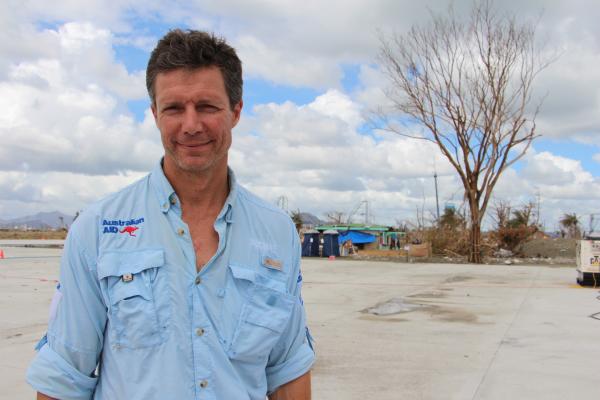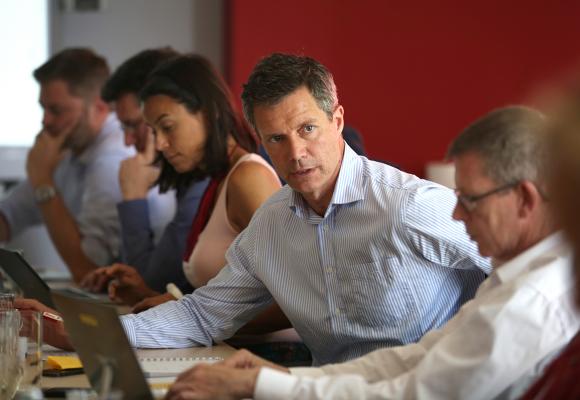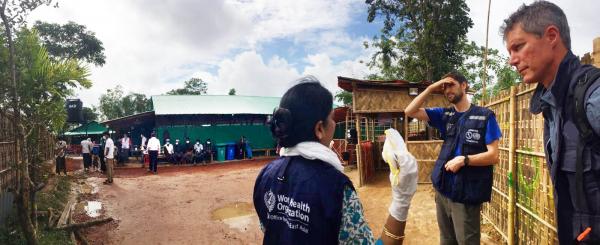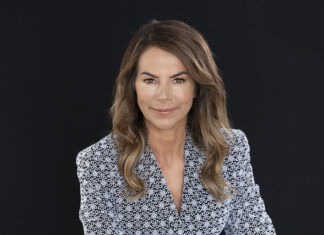Noosa-based specialist emergency physician Ian Norton was lending a hand to Noosa businesses to develop their Covid-safe plans when the coronavirus second wave hit Melbourne and the Australian Government called on him to take charge of the crisis in aged care.
With 20 years experience in emergency medicine across the world there was no one in Australia better placed to take on the task.
Unfortunately the lear jet promised to carry him and a group of Queensland nurses south fell through so, taking it in his stride, he went on Jetstar.
Dr Norton led a team of 70 people including two colleagues who accompanied him from Noosa.
There were 150 aged care facilities infected at the one time. In some cases 50 per cent of staff had been sent home to isolate, he said.
“It was tragic the people were not there who knew the residents – what they liked, what they ate,” he said.
“People weren’t getting the basic care.
“Aged care is a vulnerable setting. When you have people living in close proximity like on a cruise ship you have to gauge their symptoms. They may be masked in people who have a lot of other issues.
“A main driver was people having various places of work, but they need to make a living.“
As we’ve all learnt the older population are the worst impacted by Covid and Dr Norton had to contend with many factors.
“There were so many players and so many places. State has state laws. Facilities are privately owned, federally funded. The question is who’s going to manage it,“ he said.
“We were all there for the same reason to care for the vulnerable.“
Within nine days his team had created an electronic management system to coordinate facility records and operate between the levels of government.“We coordinated Ausmat teams coming in. They were working on the ground. The defence forces had teams on the ground. We were getting plans in place, not just PPE – emergency procedures, managing clinical waste. Some had half a shipping container of waste a day, all potentially infected. They didn’t know where to put it. Their systems couldn’t manage. We were looking at the logistics.“
Ninety-seven per cent of aged care facilities had said they were ready for Covid, but clearly being ready on paper and truly being ready weren’t the same, he said.
Having returned to Queensland from Victoria Dr Norton is in the required two weeks isolation. He left behind an incident management electronic system, a preventative system, that was working well and an aged care system “in a much better place“. “We put in a set of plans and documented it well,“ he said.
“This should be improving things. The rates at nearly every facility has decreased“.
A 45-page guidebook has now been created in Canberra to give to the states to show how Victorian aged care was set up. “It’s a start,“ he said.
Prior to this Dr Norton was called on to assist the now famous Ruby Princess cruise ship as it sat off Sydney after all passengers had disembarked.
“We found a quarter of the crew were infected and 100 people had symptoms. We organised with the government to bring them in,” he said and he did a review of the vessel.
From war-zones to natural disasters to infectious disease outbreaks across the world there are similarities Dr Norton has found in their management.
“It’s about trying to put yourself in other people’s shoes and showing people respect,“ he said.
“It’s not about being a doctor. It’s health diplomacy. I should have done politics. You have to keep calm when everything’s going crazy.“
Dr Norton follows the Colin Powell 40/70 rule when making decisions in emergency management.
“If you make a decision with 40 per cent of the facts you’re flying by the seat of your pants. If you wait past having 70 per cent of facts you’ve waited too long.
“In health you want 99 per cent surety. You don’t make decisions without that knowledge. That’s against what you do in health emergency management.“
Dr Norton completed his medical training in Ireland then moved to Australia for post-graduate studies specialising in emergency medicine, surgery, international health and tropical medicine. He went first to Newcastle then spent two years in Nambour before settling in Darwin where he was involved in managing mass casualties from incidents including the Bali bombing and the arrival of a boat load of Afghan refugees with 44 who were badly burnt. He set up a training program in Darwin from 2009, becoming the director of the Disaster Preparedness and Response at the National Critical Care and Trauma Response Centre (NCCTRC). He established the Australian Medical Assistance Teams (AUSMAT) framework and designed the field hospitals that are today used for international disaster and infectious disease responses and led the AUSMAT team to the Pakistan floods, Typhoon Haiyan in the Philippines and other incidents in the Pacific.
The World Health Organisation invited him to work in Geneva on a two-year contract that turned into six years.
He said having learnt to deal with eight different states of Australia while in Darwin was good training for working with 195 countries with WHO.
“There are similar themes from a village to a country. You have to work out a common ground,“ he said.
Dr Norton headed the WHO’s Emergency Medical Team (EMT) Initiative program in HQ Geneva from 2014 until January 2020.
His work with the WHO assisted organizations and member states to build capacity and strengthen health systems by coordinating the deployment of quality-assured medical teams in emergencies and outbreaks in over 130 countries across the globe. He is the lead author of the current WHO Global Classification and Standards for EMT deployments to disasters.
With WHO he was deployed in August 2014 for over 5 months to West Africa as part of the Ebola outbreak response and was met by chaos.
“In Liberia there were curfews imposed. They were shooting live rounds in the streets to control riots,“ he said. “They were not messaging what the disease was about. If information tells the people the rules are there for community protection then it works. They were afraid to make decisions. They estimated 1.5million people would get infected. There were people dying on the streets all over the place. The military was going to come and and take anyone with a fever to a camp, truck in food and leave them.
“I said you can’t do that – give me four weeks to build 1000 beds. We got there.
“In the early days it infected a lot of health workers. They got scared and refused to come back. They had to have the right incentive to come to work. All it took was $5 a day.“
The disease took a heavy toll but fear took an even greater toll. “Eleven thousand people died from Ebola, 33,000 people died from a lack of a hospital system (from other illnesses). No one wanted to go to hospital.“
In April 2015 Dr Norton led the coordination of 132 EMTs to Nepal during the earthquakes.
“We were there to support their leadership,“ he said. “It didn’t put WHO on a pedestal, it put WHO in a position of support“ which is where he believes WHO’s role should be. It was long days working with lovely people and he got to know when an aftershock was large enough to warrant getting out of bed.
War-torn Mosul in Iraq was a much tougher gig and a political mine field. Dr Norton said the traditional NGOs refused to enter the war zone for fear ISIS militant would interpret their presence as support for the opposition.
“We’ll treat whatever comes out,“ they told him.
“It was the biggest urban warfare since WWII. We found a lot of small NGOs who agreed to come 100m from the front lines and built field hospitals. We saved 1800 people. We did something.“
After 15-20 years Dr Norton continues to work on the frontline because “someone has to do it“. He has the ability to “keep his head“ when others around him are losing there’s and to see the way forward.
With his wife and nine-year-old son he has now based himself in Noosa, a place he loves to work on his own terms after establishing a social enterprise business, Respond Global, with the aim of empowering others to plan, prepare and respond to health emergencies in their own countries.
For more visit respond global.com









